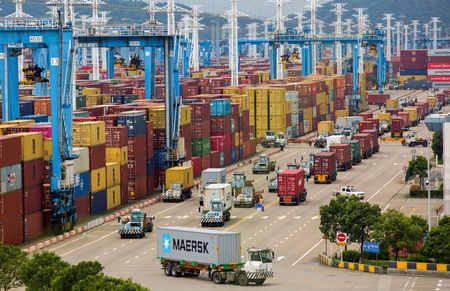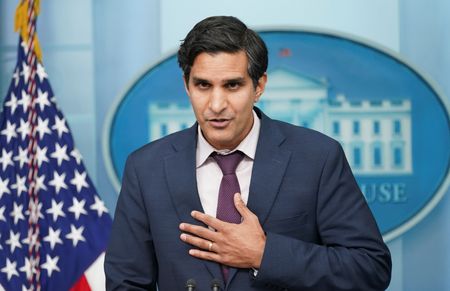

By Andrea Shalal
WASHINGTON (Reuters) -A White House adviser on Thursday suggested the United States could lower tariffs imposed on a host of non-strategic Chinese goods such as bicycles or apparel to help combat inflation.
Deputy National Security Adviser Daleep Singh said tariffs imposed by the former Trump government may have given the administration some negotiating leverage, but these tariffs served no strategic purpose, and China had similar non-strategic retaliatory tariffs in place.
“So that’s the opportunity,” he told an event hosted by the Bretton Woods Committee. “It could be that in this moment of elevated inflation and China having its own very serious supply chain concerns … maybe there’s something we can do there.”
Inflation is a critical concern for President Joe Biden, whose approval ratings are falling as the costs of energy, food and other staples increase, and his Democrats are at serious risk of losing their majorities in Congress in midterm congressional elections in November.
U.S. Trade Representative Katherine Tai has restarted an exclusion process that could lower tariffs on some Chinese goods, but has made no major moves to wholesale remove tariffs on hundreds of billions of dollars of Chinese goods.
The United States could use tariffs to advance strategic priorities such as strengthening critical supply chains and maintaining U.S. preeminence in foundational technologies and to support national security, Singh said.
“For product categories that are not implicated by those objectives, there’s not much of a case for those tariffs being in place,” he said. “Why do we have tariffs on bicycles or apparel or underwear?”
U.S. Treasury Secretary Janet Yellen in December said lowering Trump-era tariffs on imported goods from China through a revived exclusion process could help ease some inflationary pressures, although she stressed it would be no “game-changer.”
Singh’s comments come as Washington is urging Beijing to refrain from undermining sweeping sanctions imposed on Russia over its war in Ukraine.
Singh said the Biden administration believed Chinese banks and companies were largely being cautious and steering clear of helping Russia to evade Western sanctions, and underscored China’s interest in continuing to trade with the West.
Singh said it was clear that Chinese President Xi Jinping wanted to achieve supremacy through economic and technological dominance, but there were areas where the two countries could cooperate, including to combat climate change.
He said Xi was likely to continue to rely on state-owned enterprises and national champions, and they would continue to receive very heavy government subsidies.
(Reporting by Andrea Shalal; Editing by Chris Reese and Cynthia Osterman)

